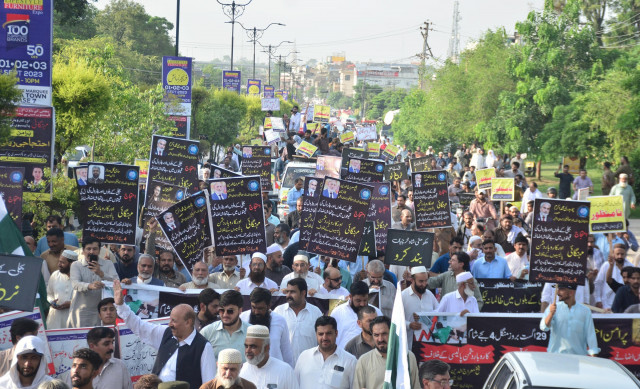Govt employees join power protests
Demonstrations against inflated electricity bills enter eighth day

Similar to other cities, the protests against the exorbitant power bill continued for the eight consecutive day in Rawalpindi with government employees, traders and students showing up in support on Thursday.
The first protest took place on GT Road in Gujar Khan where the protesters used a variety of obstacles to block the road for traffic while shouting slogans against the Islamabad Electric Supply Company (IESCO).
The protest drew a large attendance of Tehsil Bar officials, representatives, businesspeople, students, and civilians. The protesters were carrying electricity bills and placards in their hands.
They demanded the caretaker federal government immediately reverse the hike in the bills since consumers cannot afford to pay such high costs in the current economic conditions.
The two-hour-long demonstration significantly hampered the flow of traffic on the GT Road. The passengers faced severe issues because of the scorching temperatures as huge lines of cars arriving and departing from Lahore were formed on the road.
PR workers protest
On the other hand, the workers of Pakistan Railways also protested against low salaries and increases in utility bills at the Rawalpindi Railway Station.
They chanted slogans against the rising power costs, inflation, and unpaid salaries. Scores of workers, who took part in the protest, held banners and placards in their hands.
The workers circled the platform of the Rawalpindi Railway Station while chanting slogans against the PR management. The protesting workers demanded that the increase in the power bills be reversed and that their salaries be paid on time.
The protesters said that because the salaries of the class four employees were paid late each month, their daily living was being negatively impacted.
Traders split into two groups
On the other hand, on the call of a shutter-down strike by the Markazi Anjuman-e-Tajran Rawalpindi, the traders were split into two groups.
Most Rawalpindi traders disregarded the call for a strike and continued to operate their businesses as usual in all commercial areas.
Anjuman-e-Tajran Punjab President, Shahid Ghafoor Paracha, stated that the Central Anjuman-e-Tajiran Association of Rawalpindi and Punjab has separated itself from the strike call.
“The nationwide shutdown will take place on the same day, without a separate call from any one union,” he explained. “The purpose of the shutdown is to register our protest against the brutal electricity bills,” he added.
Paracha said no businesses were shut down in Punjab or Rawalpindi and that everyone was conducting business as usual. “All small and big business centres of Rawalpindi City and Cantt are open and regular business operations are being conducted,” he said.
The protests against the rising utility charges have been going on in Rawalpindi and other cities for a week as a wave of stagflation has engulfed the country in the wake of the worsening economic crisis. Waves of violent protests have swept the nation with citizens vehemently rejecting the exorbitant prices of electricity. Citizens, traders and business communities across the nation declared they were no longer willing to shoulder the weight of exorbitant electricity costs, outrightly refusing to pay the bills while resisting any actions to disconnect their electricity supply.
The government has so far failed to quell the mounting discontent among the masses over the skyrocketing electricity bills with the caretaker Prime Minister Anwaarul Haq Kakar directing the authorities concerned to devise concrete measures aimed at alleviating the burden on the public.
Published in The Express Tribune, September 1st, 2023.



















COMMENTS
Comments are moderated and generally will be posted if they are on-topic and not abusive.
For more information, please see our Comments FAQ